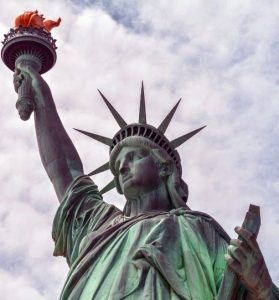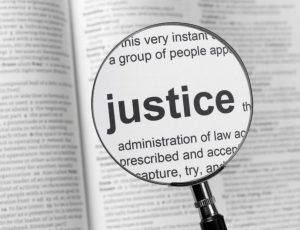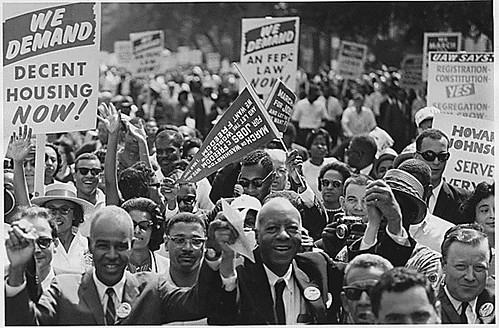Home » class prejudice
Category Archives: class prejudice
Voting Is Radical
 If you have not already voted – you are undecided, disillusioned, resentful or just plain tired of it all – realize that people like you who care about class justice must vote. It is an act of resistance. Why?
If you have not already voted – you are undecided, disillusioned, resentful or just plain tired of it all – realize that people like you who care about class justice must vote. It is an act of resistance. Why?
When the U.S. Constitution was adopted on June 21, 1788, voting was left to the states. With rare exception, only white Anglo-Saxon Protestant males, who own property and were older than 21 were allowed to vote.* So, only those with extreme class advantage were given this right, one that many of us have taken for granted for decades now.
But most of us also know that the right to vote was doled out to those of us with limited class advantage slowly and painfully. Black men were “allowed” to vote in 1870 but racist AND classist obstacles like poll taxes and literacy tests (even in states like Connecticut) kept most from doing so for generations. Of course, henchmen for the owning classes meted out violence on Black men with some class advantage who tried to vote.
It took until 1920 for women to “earn” the opportunity to vote, but Black women in many southern states were not able to vote until many years later. According to History.com:
“Native Americans—both men and women—did not gain the right to vote until the Snyder Act of 1924, four years after the ratification of the 19th Amendment and more than 50 years after the passage of the 15th Amendment. Even then, some Western states, including Arizona, New Mexico and Utah, didn’t grant Native Americans the right to vote until the 1940s and ‘50s. It wasn’t until the Cable Act of 1922 that women were allowed to keep their citizenship – and gain the right to vote – if they were married to an immigrant (who had to be eligible to become a U.S. citizen).
In Puerto Rico, literate women won the right to vote in 1929, but it wasn’t until 1935 that all women were given that right. Realize that literacy tests were extremely difficult to pass.**
And Asian American immigrant women were denied the right to vote until 1952 when the Immigration and Nationality Act allowed them to become citizens.”
If this does not convince you that voting is radical, you know that there are those with great class privilege in the United States who are using every advantage they have right now, money, access to media and social media, connections and more, to keep the rest of us from voting. According to the Brennan Center, states have added almost 100 laws restricting voting since the Voting Rights Act was rendered nearly toothless a decade ago.
I know you share UU Class Conversations’ passion for class justice and an end to classism. So, voting is something you must do, right? Happy voting. And thank you for ensuring that this right continues with people who care about it as much as you do
* A few states allowed free Black men to vote, and New Jersey also included unmarried and widowed women who owned property.
** https://www.history.com/news/19th-amendment-voter-suppression
Special Youth Blog
ICE, Refugees and Justice
Give me your tired, your poor, your huddled masses yearning to breathe free, The wretched refuse of your teeming shore. Send these, the homeless, tempest-tossed to me, I lift my lamp beside the golden door!
Emma Lazurus, 1883
 A refugee by definition is a person who has been forced to leave their country in order to escape war, persecution or natural disaster. These are typically people with no homes, no money, no tangible evidence of their past life, because they had to move often without any advanced warning for their survival. These are people who despite their former social class advantage are left with very little.
A refugee by definition is a person who has been forced to leave their country in order to escape war, persecution or natural disaster. These are typically people with no homes, no money, no tangible evidence of their past life, because they had to move often without any advanced warning for their survival. These are people who despite their former social class advantage are left with very little.
There are 26.4 million of these people in the world right now. According to Amnesty International, all refugees have the right to receive assistance, the right to protection from abuse and the freedom to seek asylum, regardless of who they are or where they come from. What does the United States have in order to help refugees? Well, one of the most notable and feared agencies is the U.S. Immigration and Customs Enforcement, famously known as ICE. ICE has one thing they are especially good at doing; sending many refugees back home. These refugees get sent back because they don’t have proper documentation, money or identification. Things I would assume that a refugee would have trouble attaining just based on the definition of a refugee.
We have to protect the values of our United States, the values our founding fathers used to create the constitution. The values that throughout United States history were exemplified by hope, refuge and new beginnings. For we are truly the land of second chances. The Statue of Liberty offers a beacon of hope to those around the world that the United States is the home of freedom and liberty. ICE contradicts these values. ICE. isn’t patriotic. The agency seems to be interested in preventing some people from getting to experience these patriotic values.
I have a question for each of you. Are your family members or ancestors immigrants? If so, they likely moved to the United States for freedom and hope or whatever reason that was important to them. Aren’t you glad that they did that so you can have the life you have? Aren’t you glad that the family your ancestors started is here? Aren’t you proud of your heritage, whatever it may be? So why do we want to restrict other people from doing the same? Do we not want to give them the chance to build a family and a life, just like yours did?
This past summer Afghanistan fell to the Taliban. Now, there are more than five million Afghan refugees, many of which are trying to flee to the United States for safety. The U.S. response has been to send most of these refugees to holding centers or other places outside of the United States. They denied these people safety. Will they do the same to Ukrainians fleeing the war?
I work in a restaurant and many of the Immigrants I work with are afraid. One of my friends is constantly afraid of getting deported to Mexico, even though he is legally here and not even from Mexico. My friend works every day to support his family. He is 17 and goes to high school and has two jobs. He is the father figure to his younger brothers and he supports his mom financially. Why would ICE deport him, an honest kid just trying to give a better life to his mother and brothers? Why does he live in fear when he has not done anything wrong?
When I read about these people, they aren’t just statistics but mothers, fathers and my friends who are scared, scared for their future and their children’s future. They are not wealthy or influential, but they work hard and are decent and honest people just trying to live.
“Refugee Admissions – United States Department of State.” U.S. Department of State, U.S. Department of State, 8 Oct. 2021, www.state.gov/refugee-admissions/.
It’s Hard Right Now, but Keep Moving Forward
 Denise Moorehead, UU Class Conversations
Denise Moorehead, UU Class Conversations
I sat in a staff meeting on Wednesday morning, May 25, 2022, listening to my colleagues share their reactions to a gunman’s rampage that killed 19 children and two teachers in Uvalde, Texas, the day before. We are administrators for private schools serving students from 2 to 20 years old. The head of our team said his first response was to scream, “NO MORE.” Another — the most buttoned-down one among us — said she was so #!!*ing tired of the carnage followed by nothing from those at the highest levels elected to make change.
When we talked about the steps we’d taken/needed to take to support our students and parents, the remarks by one school director broke my heart. She said with a deep sigh, “We sent an email to parents last night. We updated a message that was first written to families 10 years ago after the Newtown, Conn., massacre.” She added that she had updated that letter countless times for the many mass shootings since Newtown as well as for state-instituted killings like that of George Floyd.
In the past decade, our schools have made a substantial investment in improving security and in preparing students and staff to react quickly in cases of a dangerous intruder. So, why are we stuck in the same place 10 years after Newtown? As one politically-active colleague said of her own social justice efforts, “Why even bother anymore?”
Why? Because we must.
But It’s Hard
I have been involved in social justice work since I was a child. My mom took me to community-building activities while I was still in grade school. These are hard times for people who believe in social justice, equity, and addressing classism and racism.
The expected overturning of Roe v. Wade will most severely impact women and families with less class advantage. According to a May 2022 NPR report on the landmark Turnaway Study, women denied an abortion were four times more likely to be living in poverty years later than those who had one. Their children were less likely to attain higher education were more likely to be involved in crime and had lower adult earnings.
According to a recent study by Columbia University researchers, more than 3.7 million children in the U.S. slipped into poverty when conservative members of Congress refused to extend the expanded Child Tax Credit beyond December 2021. States across the nation have outlawed telling the truth about racism and the racial wealth gap, allowing transgender children to become themselves or even providing water to people waiting in line to vote (in under-resourced primarily black and brown areas). The proliferation of new voter suppression laws is meant to keep people of color and those with less class advantage from participating in American democracy. And this is the tip of the iceberg when we look at the backpedaling of policies that have advanced social justice, equity and equality.
The effects of these policy reversals have not and will not directly touch the lives of people in the sphere of our elected officials. Over half of the members of Congress are well-educated millionaires from safe neighborhoods with “good schools.” According to FundHero December 2020 research, even in local elections the average cost for each vote received is $1.00. I don’t know about you, but I don’t have $5,000 to be elected to the local Library Board.
It’s no surprise then, that most federal and local policies support those with more class advantage. This is true of gun laws also. According to Mark S. Kaplan, professor of Social Welfare at UCLA, there is a strong relationship between poverty, inequality and firearm violence*.
It’s Up to Us
It is hard to keep up the fight for justice right now, whether it is for social class, race, gender, LQBTQ+, disability rights and/or other forms of equity. But oppression can only fester and grow when people give up hope for a future that holds promise for each person. We can pause for a few moments to feel sad, overwhelmed and discouraged. We are human. But then we have to take a breath, regroup and keep pushing forward.
Here are just some of the lesser-known social justice pioneers I appreciate:
- Frances Perkins, the first woman to serve as a member of a U.S. president’s Cabinet and a champion of those with less class advantage.
- South African students who mobilized and led the 2015-17 #RhodesMustFall and #FeesMustFall movements that fundamentally changed the landscape of higher education in South Africa.
- U.S. racial justice heroes like John Lewis, A. Philip Randolph, Bayard Rustin, Ella Baker, Callie House and Fred Korematsu, Lupe Anguiano and Chrystos (Menominee)
- Frank Bowe who worked to help people with disabilities
- Modern-day and historical women’s rights activists like Panusaya Sithijirawattanakul and Emmeline Pankhurst
- Environmentalists like Nnimmo Bassey
Who are the modern-day and historical (s)heroes who inspire you to stay the course when you feel like giving up? Share yours in the comments below.
*The gun lobby is bankrolled by people and companies with deep pockets. Some contributors to the still powerful National Rifle Association have been Remington Outdoor Company (formerly Freedom Group), Smith & Wesson, Beretta USA, Springfield Armory, and Sturm, Ruger & Co. as well as accessories vendors MidwayUSA and Brownells (Violence Poverty Center). Individual contributors include more than a dozen wealthy Russians. The NRA, in turn, lines the campaign coffers of politicians willing to do its bidding.
Unity Based on Justice
 In July of 2020, UU Class Conversations published the blog post The Time to Unite as One America is Now about police brutality and the systemic oppression of Black and other people of color throughout the United States. It focused on how the deaths of black and brown men and women by police officers sparked international protests. The protesters were labelled terrorists, thugs and unpatriotic by some conservative media outlets and politicians.
In July of 2020, UU Class Conversations published the blog post The Time to Unite as One America is Now about police brutality and the systemic oppression of Black and other people of color throughout the United States. It focused on how the deaths of black and brown men and women by police officers sparked international protests. The protesters were labelled terrorists, thugs and unpatriotic by some conservative media outlets and politicians.
Just a few weeks earlier, some of the same media outlets and politicians had proffered a very different response when heavily armed, mostly White, protesters stormed the Michigan capitol building, threatening to kidnap and possibly kill the governor. Why? The rioters were upset about stay-at-home orders during a pandemic.
These protesters were called patriots. Police stood down, the National Guard was not called in to quell the unrest, and there were no arrests, no tear gas deployed, and no curfews imposed and enforced. Both times Americans were exercising their First Amendment rights. Yet, there were very different outcomes and consequences for those protesting.
Down a Dangerous Road
Well, fast-forward less than six months later and due to a steady stream of falsehoods and conspiracy theories from politicians, including the lame duck U.S. president about the legitimacy of the presidential election, a mob of armed white supremacists were incited to attempt an insurrection of another American Capital building. The intent was the same: Harm the legislature, including the vice president, speaker of the House and members of the House and the Senate. This time, the riot was deadly and dozens of police officers were injured and six people have died: All this in America.
Using Racial Tropes to Obscure Class
Why? Well, the idea that real Americans can only look a certain way and cannot be immigrants or people of color or a different religion. Many Americans overwhelmingly ignore the fact that class inequalities are not just part of the black or brown experience but a struggle for all Americans who are low-income or working class. This is increasingly true also for middle class people. This ingrained belief keeps many lacking class privilege from joining others of a different race or religion and undercuts any potential unity across racial lines.
There is little self-reflection for most Americans on how their class differences shape their backgrounds and unique attitudes and behaviors. Few consider how these class differences actually can bridge racial and religious divides, if explored. The class designation is overshadowed by the ever-present racial divide. So much so that economic initiatives often proposed by progressive or moderate politicians are viewed as handouts or bailouts by certain Americans. Stimulus checks, for example, are considered nonessential because they would go to the undeserving.
The idea that those with less class advantage are lazy is often intentionally conflated as coded messages about immigrants and people of color and creates an us versus them paradigm. Imagine, if people living in poverty and those in the working and middle class actually recognized that their commonalities outweigh their differences?
Our Truth
Some White poor and working class people continue to believe that they have more in common with others of their race who have substantial class privilege than they do with black and brown people of limited privilege. They have bought the idea that the We (Whites of all classes) have to stick together to protect our country, our flag, our families and our country’s traditions as Whites – despite economic differences. It’s imperative, or the them will take over, and as the neo-Nazi chant in Charlottesville suggested, they will erase us.
The idea that the votes of people of color are less legitimate than those of Whites is a shameful part of American history that is still alive and why insurrectionists carried Confederate flags through the Capital buildings during both riots.
With the current (and much-needed) focus on racial differences, Americans overwhelmingly are unable to recognize class and classism. Moreover, American economic and political systems that widen the income gap are rarely challenged in substantive ways. The status quo is the gold standard, and U.S. policies and practices routinely benefit the wealthy and affluent at the expense of other Americans.
Until we as a nation wake up and realize that the status quo is not working for most Americans, we are destined to routinely make the same choices that continue to divide us. And, if the latest insurrections teach us anything, there is a growing angry and violent group of Americans who, if not addressed, are intent on ripping the country apart.
But there is much cause for hope in the coming months. The end of the coronavirus – while still distant – is finally in sight. The fervor of the racial justice movement is still high. New federal leadership has said it is committed to addressing class inequities and white supremacy. So, in our UU congregations and organizations let’s heighten the meaningful dialogue – and act upon – racial and class justice.

